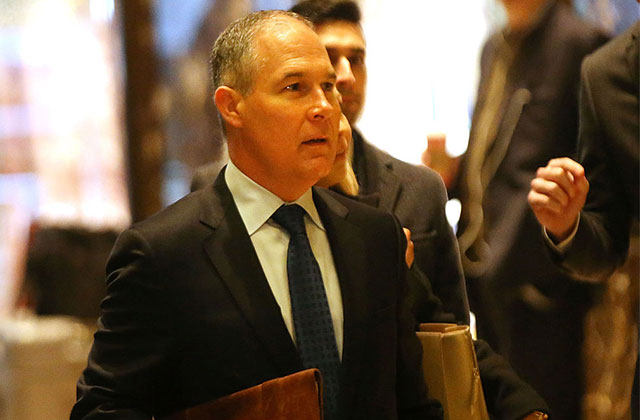3 Things People of Color Need to Know About Trump's EPA Pick

After weeks of speculation, the president-elect has decided who will head the EPA. His name is Scott Pruitt. As Oklahoma attorney general since 2010, Pruitt has been staunchly anti-EPA: He’s been involved in at least nine lawsuits with the federal agency, often challenging its power over state governments.
Like the majority of President-elect Donald Trump’s staff picks, Pruitt does not agree with the science behind climate change. In May, he wrote for the National Review that the global warming debate “is far from settled”—even though 97 percent or more of actively publishing climate scientists agree that climate change is real and that humans are behind it.
Now, as head of the EPA, Pruitt will have the power to enforce—or, rather, not—the federal regulations created by the agency that are meant to protect the health of the planet and its inhabitants. Policies like the Clean Air Act and Clean Water Act will be under his control. So will the agency's environmental justice program, which arguably already exhibits a lack of concern for environmental discrimination, according to the U.S. Commission on Civil Rights.
Pruitt has also argued that the EPA oversteps its duties, so he will likely minimize the agency's involvement in state decisions, granting states the power to pollute and emit carbon as they desire. This aligns with Trump's plan to revive the coal industry, reduce regulation and ignore the climate catastrophe. Trump can't take these actions alone—he needs the support of the EPA, which he has now ensured.
"For too long, the Environmental Protection Agency has spent taxpayer dollars on an out-of-control anti-energy agenda that has destroyed millions of jobs, while also undermining our incredible farmers and many other businesses and industries at every turn," Trump said in a statement Thursday, according to NBC News. With Trump's claim that Pruitt would "reverse this trend," communities of color may be the ones to bear the worst of it. Here's why:
Pruitt doesn't prioritize emissions reductions.
Dropping emissions will bring the U.S. a lot closer to combating climate change. As long as carbon and methane continue to enter the atmosphere irresponsibly, the planet will keep warming and the situation will not improve.
This, however, does not seem to matter to Pruitt. In 2011, he sued the EPA over its plan to reduce pollution from coal plants. (Reducing air pollution drops emissions since both are often released at the same from from the same sources.) Later that year, Pruitt sued again for similar reasons, except this time it was over power plant air pollution. Most recently, his target has been the Clean Power Plan, which reduces emissions from coal plants. These polluting plants—be it coal or oil refineries—are often placed near communities of color, who must then deal with the health problems that result from their proximity, like asthma and cancer.
He's an ally to the fossil fuel industry.
In 2014, energy lobbyists drafted letters for Pruitt to send to federal regulators, a New York Times investigation revealed. He sent these letters, written on state stationary, to the EPA, the Department of the Interior and President Obama. The letters claimed that these entities were wrong about the air pollution resulting from natural gas drilling. They claimed that the agencies overestimated. The Times also mentioned that a close partner of his, Harold G. Hamm, is CEO of Continental Resources, one of the biggest oil and gas companies in Oklahoma and North Dakota.
The fossil fuel industry is undesirable number one for many environmental justice advocates who want the industry out of their backyards. In California, that means shutting down refineries that pollute their air. In the Gulf, it would mean ending offshore drilling that results in toxic spills. Across the country, commuities want the power to decide what industries are welcomed, but that won't be easy so long as fossil fuel giants have their hands in the pockets of government leaders like Pruitt. He's accepted contributions from the industry, the Times reports.
He questions climate change.
This might be the biggest red flag. Climate change is, arguably, one of humanity's greatest dilemmas today—and the EPA is the agency that is supposed to work to reverse it. A report came out earlier this week showing how extreme storms will change across North America. Places like the Southwest and the Gulf, where communities of color tend to concentrate, will see the worst of it. The Global South will be most harmed by extreme weather patterns, including storms and droughts, even though they had little to do with the human-made climate disaster enveloping the planet.
